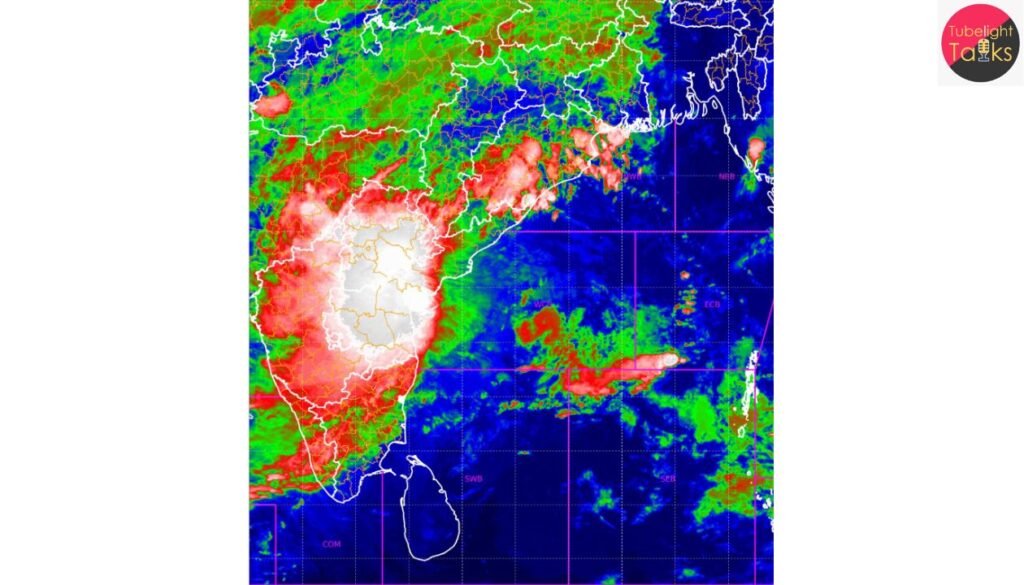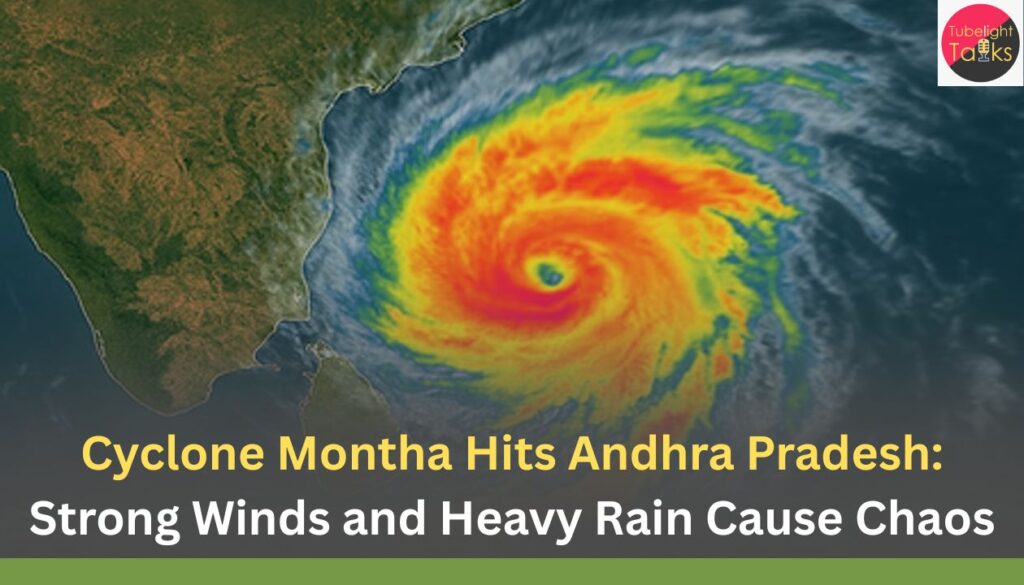Cyclone Montha hits, emerging from the Bay of Bengal, made landfall on the Andhra Pradesh coast late last night, bringing with it fierce winds, heavy rainfall, and widespread disruption. The India Meteorological Department (IMD) had already issued red alerts for coastal districts, and as predicted, the cyclone began showing its full impact overnight.
Trees have been uprooted, power lines damaged, and several regions are facing electricity cuts. The strong winds — reaching speeds of up to 110 km/h — have caused severe property damage, while heavy rain has flooded low-lying areas.
Landfall and Initial Impact
Cyclone Montha struck between the Kakinada and Machilipatnam coasts late on Monday night. According to IMD officials, the storm packed wind speeds between 100–110 km/h, gusting up to 120 km/h. The sea turned rough, with waves as high as 6 meters in some areas, forcing the complete suspension of fishing and port activities.
Several villages near the coast were evacuated earlier as a precautionary measure. Disaster management teams have been deployed across all high-risk zones.
Flights and Trains Disrupted
Air and rail services have been heavily affected. Around 32 flights were canceled from Visakhapatnam Airport, while Indian Railways suspended over 100 train services in the South-Central and East Coastal zones. Many roads have become impassable due to fallen trees and waterlogging.
Local authorities have urged people to stay indoors and avoid unnecessary travel. Emergency helplines have been activated to provide assistance and real-time updates.
Possible Impact on Other States
Weather experts have warned that the cyclone’s effects may not be limited to Andhra Pradesh. The storm system is expected to move northward, causing heavy rain in Odisha and West Bengal, followed by scattered rainfall in eastern Uttar Pradesh, Madhya Pradesh, and parts of Rajasthan.

Kolkata and South Bengal are likely to receive heavy downpours until October 31, while northern and central India may experience cooler temperatures due to the cyclone’s moisture spread.
Precautions and Government Response
Authorities have instructed fishermen to stay away from the sea until further notice, as tidal waves and undercurrents remain dangerous. State Disaster Response Forces and NDRF teams are on standby in all affected districts. Relief centers have been set up, and essential supplies are being distributed to ensure safety and comfort for displaced families.
The IMD has also stated that Cyclone Montha will weaken into a deep depression within the next 48 hours, but its remnants may continue to influence weather conditions in several northern regions.
Read Also: Cyclone Montha Eyed MidEast Coast as India Mobilises for Impact
Role of Humanity to True Devotion
In times of natural disasters like Cyclone Montha, when fear and panic spread among people, the teachings of Sant Rampal Ji Maharaj provide strength, peace, and understanding. Satguru Rampal Ji Maharaj explains through Gyan Ganga that such natural calamities are signs for humanity to realize the importance of true devotion and to live according to the laws of the Supreme God.
He teaches that when people follow true spiritual knowledge and stop wrong practices such as idol worship, intoxication, and animal killing, nature becomes balanced and peaceful.
Sant Rampal Ji Maharaj always emphasizes compassion, unity, and service to humanity during difficult times. His followers across India participate in relief activities through Satlok Ashrams by providing food, shelter, and help to those affected by floods, storms, or droughts. His teachings inspire calmness, care, and discipline in such moments, showing that true spirituality is not only about worship but also about protecting humanity and nature through pure intentions and righteous deeds.
Timely Alerts Prevented Major Casualties
Cyclone Montha has once again reminded us of nature’s unpredictable power. With strong winds, torrential rains, and infrastructure damage, Andhra Pradesh is facing one of its toughest weather challenges this year. However, due to timely alerts and coordinated efforts from the government and rescue teams, major casualties have been prevented so far.
By the grace of the Supreme God, may all affected people stay safe, and may the state soon recover from this disaster.
FAQs: Cyclone Montha
Q1. What is Cyclone Montha?
Cyclone Montha is a powerful tropical storm that formed over the Bay of Bengal and made landfall along the Andhra Pradesh coast, bringing heavy rain and strong winds.
Q2. Which areas were most affected by Cyclone Montha?
The coastal regions of Kakinada, Machilipatnam, and Visakhapatnam in Andhra Pradesh were among the worst affected, with severe wind damage and flooding reported.
Q3. What was the wind speed of Cyclone Montha?
According to the IMD, wind speeds during landfall reached 100–110 km/h, gusting up to 120 km/h in some areas.
Q4. How did Cyclone Montha affect transport and daily life?
The cyclone disrupted flights, train services, and road transport. Many flights were canceled, and train routes were suspended due to fallen trees and waterlogging. Power supply and communication lines were also damaged in some areas.
Q5. What measures have the government and authorities taken?
The National Disaster Response Force (NDRF) and State Disaster Response Force (SDRF) teams were deployed to affected districts. Evacuations were carried out, relief camps were opened, and emergency helplines were activated for public safety.
Q6. Will Cyclone Montha affect other states too?
Yes. The cyclone’s remnants are expected to cause heavy rainfall in parts of Odisha, West Bengal, Madhya Pradesh, and eastern Uttar Pradesh over the next few days.
Q7. What does Sant Rampal Ji Maharaj teach about such natural calamities?
Sant Rampal Ji Maharaj explains that disasters like cyclones and floods occur due to imbalance in nature caused by human wrongdoing. He teaches that by following true worship of the Supreme God and living with honesty, compassion, and purity, nature’s balance can be restored and such calamities can be prevented.
Q8. How can people stay safe during cyclones?
People should stay indoors, keep emergency supplies ready, avoid traveling during the storm, and follow all safety instructions given by local authorities. Fishermen should strictly avoid going into the sea until conditions improve.

![World Indigenous Peoples Day [Hindi]](https://tubelighttalks.com/wp-content/uploads/2020/08/World-Indigenous-Peoples-Day-Hindi-1-150x150.jpg)









Discussion (0)